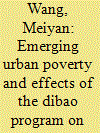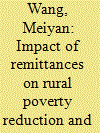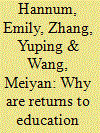|
|
|
Sort Order |
|
|
|
Items / Page
|
|
|
|
|
|
|
| Srl | Item |
| 1 |
ID:
074182


|
|
|
|
|
| Publication |
2006.
|
| Summary/Abstract |
Demographic transition has occurred more rapidly in China than in most developed countries. As the population ages, the growth rate of the working age population has started to decline and the absolute quantity of the working age population will begin to shrink after 2015, which will inevitably result in structural labor shortage. Under the circumstance where comparative advantage is still embodied in its labor-intensive commodities, timely and sufficient supply of a skilled labor force is vital for China to sustain fast economic growth.
|
|
|
|
|
|
|
|
|
|
|
|
|
|
|
|
| 2 |
ID:
076901


|
|
|
|
|
| Publication |
2007.
|
| Summary/Abstract |
The present paper describes the current urban poverty situation, examines the factors affecting the probability of a household being in poverty and investigates how the urban minimum living standard guarantee (dibao) program helps poor people to get out of poverty. The targeting efficiency of the urban dibao program is discussed. The present study finds that the poverty rate of households with unemployed workers is much higher than that of households without unemployed workers. The urban dibao program is helpful in reducing poverty rates, but it does not reduce poverty rates too much. The government should place emphasis on helping laid-off and unemployed workers to become reemployed. The most urgent problem for the dibao program is improving the efficiency of targeting.
|
|
|
|
|
|
|
|
|
|
|
|
|
|
|
|
| 3 |
ID:
102249


|
|
|
|
|
| Publication |
2010.
|
| Summary/Abstract |
This paper uses survey data from Jiangsu and Anhui provinces to examine the impact of remittances on rural poverty reduction and on rural households' living expenditure. The paper shows that remittances play an important role in rural poverty reduction. The paper also finds that rural households mainly use remittances for current consumption living expenditure rather than for investment living expenditure such as health and housing.
|
|
|
|
|
|
|
|
|
|
|
|
|
|
|
|
| 4 |
ID:
156444


|
|
|
|
|
| Summary/Abstract |
Using various sources of data, this paper examines the contributions of rural labor migration to economic growth and poverty reduction in China. The results show that there is still a significant number of people living in poverty in rural areas, while the effectiveness of migration on poverty reduction has declined, implying an urgent need for new approaches to poverty reduction. China's experiences could also be valuable for the formulation of development strategies in other developing countries.
|
|
|
|
|
|
|
|
|
|
|
|
|
|
|
|
| 5 |
ID:
124643


|
|
|
|
|
| Publication |
2013.
|
| Summary/Abstract |
It is well established that returns on education are higher for women than for men in urban China. We argue that this finding, while accurate, is misleading owing to its individualist perspective. The income to which most working-age women and men have access includes not only their own income, but also spouse income. Furthermore, decisions about participation and investment in the labour force, both consequential for income trajectories, are likely to be made with partner income and potential income in mind. To our knowledge, no research in China has explored the returns to education enjoyed via spouse income, or the implications of pooling couple income, for illuminating the returns to schooling difference for women and men. In this article, using data from the China Urban Labour Survey (2001), we argue that the returns for women, conventionally defined, are higher than for men because many women trade their own income for spouse income, and this is particularly true among less educated women. We demonstrate, first, that women who are more educated are less likely to get married, while the reverse is true for men. Second, we show that among couples there is evidence of a trade-off in investments in careers. Moreover, among couples, the less educated the woman and the more educated the man, the less likely the couple is to depend heavily on her income. Finally, we show that among couples there is a compensating reverse pattern of returns differences by sex when income is conceptualized as spouse income. Thus, in terms of total couple income, there are no returns differences by sex.
|
|
|
|
|
|
|
|
|
|
|
|
|
|
|
|
|
|
|
|
|